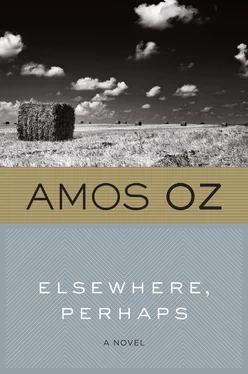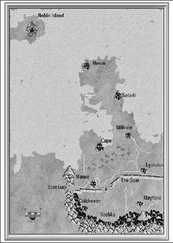Sometimes he recalls a nocturnal journey, in a truck battered by icy jets of furious rain. In his hallucination Reuven hears a voice, and a pale hand with delicate fingers softly touches his knee. Along with the hand come visions. Large birds, evening twilight, bells of distant churches. Within the shrouded image lurks something pure and crystalline, something that cannot be named. Reuven wonders and feels sad. What is it, dear God, what is this thing? Far far away it shows, with the rain and the sound of bells.
We were pleasantly surprised at this time by young Gai Harish. He had changed for the better. We are no tyros in matters of education, and we do not expect miracles. But this boy had become quieter and more serious. Even his manners had improved. Credit must go to the modest Herbert Segal, who had taken it on himself to speak to the boy and explain to him straightforwardly the meaning of tragedy and the importance of tact.
Gai looked at Herbert out of his warm dark eyes and inquired whether the baby would belong to the Berger or the Harish family. Herbert sighed and replied that the baby had no chance of being happy, because it would have no real family. Neither the Berger family nor the Harish family would be able to offer it a loving home.
Gai silently considered the matter. Finally he declared that he could love such a baby, because that kind of baby especially needed to be loved.
Herbert blinked shortsightedly. He Fidgeted with his fingers, as if he were feeling the boy's words. Gai added that his mother, too, had fallen in love with a stranger, and that was why he and Noga had grown up without a mother. He was not angry with his mother. But inwardly he had already made up his mind never to fall in love. Falling in love always leads to disaster.
Herbert uncharacteristically looked down at the floor, taking care not to meet the boy's gaze. With a certain hesitancy he explained that this was not always the case, that love sometimes made people happy. Gai agreed as far as love between men was concerned, the way that he loved his father or Tomer loved Oren. But one should never get married. Or even fall in love with a woman. One should live like you, Herbert. Without any woman. Because you're a wise man.
Herbert Segal said nothing.
Gai asked who, in Herbert's opinion, was to blame: father or mother, Noga or Ezra.
Herbert explained simply that life is sometimes complicated. There are some situations in which you cannot say that X is the guilty party and Y is the victim. Much to Herbert Segal's astonishment, Gai replied that the conflict between Jews and Arabs was an example of such a situation. Both sides say that their ancestors lived in this land and both sides are absolutely right. What is the moral? The moral is very simple. The moral is that might is right.
Herbert deferred answering immediately, hunting for a simple but crushing argument that would refute Gai's strange conclusion. At the last moment he remembered that his duty was not to defeat the child but to encourage his friendship. He therefore refrained from exercising his right to have the last word. As they parted on the doorstep, Gai looked straight into Herbert's gray eyes and made two promises. One, that he would not talk to his father or to Noga or to anyone about what had happened in the family. And, two, that he would call on Herbert from time to time for a chat or an argument. Herbert also tried to persuade Gai to let him play him some music, because music soothes the emotions and stirs up thoughts, which are our true property in life. Gai did not reply at once; he pondered and finally said that he sometimes had thoughts at night before he fell asleep. But in the daytime? In the daytime he thought only when he had to. He shook hands and left.
As he walked away, Gai said to himself that from now on it was his duty to take care of Daddy, because Daddy had problems. The thought excited him. Herbert was thinking about the boy's warm dark eyes. He came to the conclusion that the child was very mature for his age and that it would be wonderful if he could become his spiritual father. Herbert Segal was fond of Gai Harish.
The summer lost some of its earlier exuberance. The discerning eye could see the signs. True, the heat still tyrannized us with the obstinacy of an old man striving to conceal his waning vigor by means of continual bitter outbursts. It was clear, however, that the days were growing shorter. The hours of darkness, the gentle hours, lengthened. The power of the incandescent light was ebbing. The twilight became richer.
Day and night, in three shifts, tractors turned the soil in preparation for the sowing of the winter crops. Golden fields yielded to the plow and turned over to reveal their dark innards. In the orchard activity was at its height. Exhausted men filled the dining hall in the evenings. Inside the rooms the air was stifling for most of the night. More and more adventurous souls chose to sleep outside on the verandas, or even on the lawns, with white sheets wrapped over their heads to protect them from the fury of the mosquitoes. At dawn you could see a kind of scattered army of ghosts lying about, swathed in white shrouds. But the appearance is illusory. The night watchmen nudge the sleepers awake with the first glimmer of daylight. The shrouds unwrap to disclose live men and women, tired men and women, grumbling, liable to occasional gossiping and virulent petty quarrels. We must not judge them severely. The season imposes exhausting labors on them all, while we do — what? Only those whose eye is alert to the movements of the birds and the minute changes in the color of vegetation can take a certain comfort. Faint signs, like secret messages, herald the onset of other powers.
Zechariah-Siegfried Berger extended his stay at Metsudat Ram, not without pressing on the treasurer, Yitzhak Friedrich, a monthly sum to cover his keep. Ezra's complaints and Bronka's sarcasms had no effect. I am a wealthy man, and it is right and proper to dip one's hand into a rich man's pocket. If I'm not allowed to pay, I'll take offense and leave at once. Do you want to drive me away?
In her heart Bronka did indeed pray that he would pack up and go. So did many other members. But Ezra prized his brother's company, as did one of our young girls, condemned to solitude because of an embarrassing accident.
Zechariah's decision to stay was open to a number of interpretations. His own account of it was that the company of his relatives was dearer to him than that of anyone else in the whole wide world, and he loved being here because here he could observe the building of our old-new country.
Others claimed that a sordid scheme was hatching in his mind. Who could say what its object was? Perhaps he was here on Eva's instructions to persuade Noga Harish to go back to Germany with him. Such was Bronka's opinion. Or perhaps he desired the girl and wanted her for himself. So Tomer thought. Fruma Rominov held to an even more unpleasant explanation: his behavior was that of a cunning pimp, who takes a helpless girl in trouble under his wing, helps her to bring her bastard child into the world, and acquires absolute power over her body and her soul.
One's first impression of Zechariah-Siegfried would be that of a scoundrel, if one did not know about his background and outlook and his attachment to his family. It is my love of my family, he explains to Ezra, that makes me undertake the unpleasant task of resolving this girl's doubts and persuading her to go to Europe. But there is also a question of principle: her place is with her mother. She is delicate and spoiled, and she will develop better in Europe than here in the front line of battle. Moreover, if we can see the matter from Eva's point of view, how marvelous it would be for mother and daughter to have the joy of bringing up the child together. It would give Eva a purpose in life. As for my bosom friend Isaac Hamburger, I am sure that the artistic side of his character will forge strong bonds of love between him and his new daughter, and with his prospective grandchild. And I can reveal, by the way, that the most recent letter from my friends indicates their wholehearted approval of my plan.
Читать дальше












